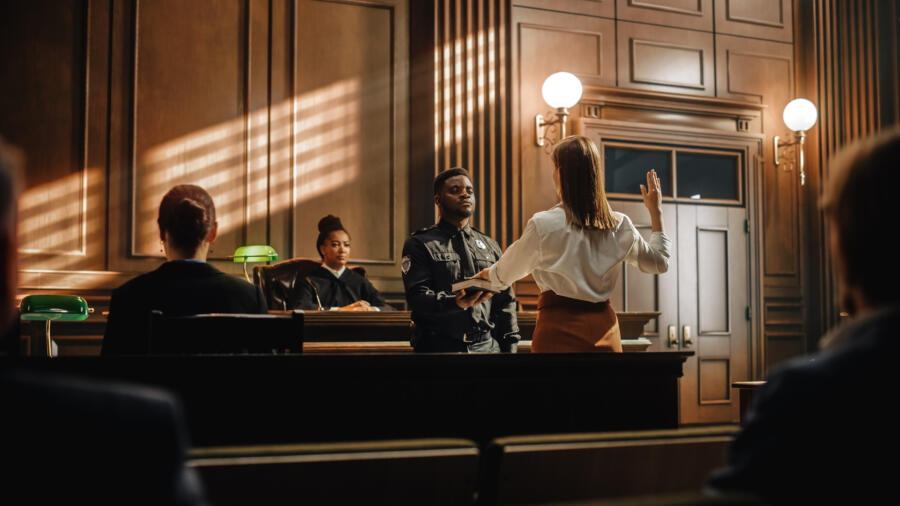According to the United States Department of Justice, 1.6 million violent crimes were committed throughout the country in 2020. This was a decline—there were 2 million such crimes the year before. While there has been some improvement in levels of crime, that still leaves many individuals who have been victimized to deal with the trauma associated with those crimes. And that doesn’t include the victim’s loved ones and family members who may also suffer as a result.
That begs the question: What rights do violent crime victims have within the justice system?
The Establishment of Victims’ Rights at the State and Federal Levels
In the 1970s and ’80s, the U.S. began to embrace programs and legislation that considered the needs of crime victims. Victim-impact statements were read in court. Feminists worked to limit the legal tactic of questioning rape survivors about their sexual history.
On a federal level, the 1984 Victims of Crime Act (VOCA) established a Crime Victim’s Fund, which provides financial assistance to crime victims.
Today in the U.S., the federal government, all 50 states and Washington, D.C. have established some victims’ rights. These vary by location, but in general victims have the right to be treated fairly, to be notified of court proceedings and to speak with prosecutors.
After a gun went off on the set of the film Rust, resulting in the death of cinematographer Halyna Hutchins, the district attorney handling the investigation told Vanity Fair, “In New Mexico, there’s a Victim’s Rights Act that’s part of our constitution, and [the Hutchins family] have an absolute right to be at all court hearings, to give their opinions on whether a plea should be offered and then to speak at sentencing.”
It’s become standard practice for crime survivors and the loved ones of murder victims to deliver impact statements in court, where these victims can say, in their own words, how the crime has affected them. At the sentencing hearing of gymnastics coach and serial sexual abuser Larry Nassar in January 2018, 156 women shared victim-impact statements.
Victims’ Rights Aren’t Always Enforced
Yet shortcomings remain in the treatment of crime victims and the protection of their rights.
The Crime Victims’ Rights Act, which passed in 2004, gave victims the right to know about plea deals. Yet when Jeffrey Epstein potentially faced federal charges for sex trafficking in 2007, federal prosecutors in Florida reached a secret “nonprosecution agreement” with the financier.
Many of Epstein’s victims weren’t told, or were even misled, about the deal. It allowed Epstein to serve 13 months in jail, with daytime release.
Courtney Wild, who accused Epstein of sexually abusing her, filed a lawsuit to void this secret plea deal. A federal judge agreed that prosecutors had violated federal law. Then Epstein’s August 2019 death, which was determined to be a suicide, resulted in the lawsuit being dismissed.
Wild’s legal team filed an appeal, but the 11th U.S. Circuit Court of Appeals ruled against her. In February 2022, the Supreme Court opted not to take the case.
In another instance, James Holmes, the mass shooter who killed 12 people and injured 58 in an Aurora, Colorado movie theater, was moved to an out-of-state prison after he was attacked inside a Colorado prison in October 2015. Holmes’s location was not shared with survivors and family members of those he killed. Several survivors said they were upset that authorities kept the transfer quiet and didn’t notify the public. In September 2017, it was revealed Holmes was incarcerated in Pennsylvania’s United States Penitentiary, Allenwood.
Convicted killer Drew Peterson is another prisoner whose current location is not being shared with his victims’ survivors by the Illinois Department of Corrections (IDOC). The IDOC said they were keeping Peterson’s location “confidential for his own safety” given Peterson was a former law enforcement officer.
“A defendant doesn’t have a right to be held in some facility secretly. Where is that in the Constitution?” University of Utah law professor and victims’ rights expert Paul Cassell tells A&E True Crime. “The defendant has a right to be protected against physical attacks, but we can do that without compromising a victim’s right to be notified about where a defendant is being held.”
The Future of Victims’ Rights
Cassell has advocated for Marsy’s Law in order to bolster victims’ rights. “Marsy’s Law is kind of a next-generation victims’ rights statute that improves upon some of the early versions of crime victims’ rights. It provides more enforcement mechanisms, it provides a more comprehensive listing of the rights that are available to crime victims. And it has language that…improves upon some of the language that existed 20 or 30 years ago that time has told us wasn’t quite as tightly written as it should have been.”
The campaign for Marsy’s Law is backed by billionaire businessman Henry Nicholas, whose sister, Marsy, was murdered in 1983. California, Florida, Georgia, Illinois, Kentucky, Nevada, North Carolina, North Dakota, Ohio, Oklahoma, Pennsylvania, South Dakota and Wisconsin have all adopted versions of Marsy’s Law.
Under Marsy’s Law, crime victims receive a Marsy’s Card that explains their rights beginning at the time of their victimization.
Sophia Fifner, a sexual assault survivor and advocate, supported the adoption of Marsy’s Law in her home state of Ohio. She tells A&E True Crime that when she was raped years earlier, she didn’t know she had any rights.
“As the daughter of immigrants, I didn’t realize I even had rights to begin with,” she says. “And Marsy’s Law changes that. It gives victims an opportunity to realize that they have a voice and an equal space within the criminal justice system.”
Of course, one law won’t resolve all the issues faced by crime victims. Not all victims are willing or able to go to the authorities. The Justice Department states that about 60 percent of violent victimizations in 2020 were not reported to police. And according to RAINN (Rape, Abuse & Incest National Network), just 310 out of every 1,000 sexual assaults are reported to law enforcement.
“The chances of us sharing our experience with a friend, or with a neighbor or with a teacher is much higher [than reporting to law enforcement],” Fifner says. Therefore, if there was more public awareness of how to support victims—including what rights they have—it would be beneficial for all communities, she says.
Cassell tells A&E True Crime he is optimistic about the future. “I’m hoping that society as a whole, not just the courts and the criminal justice system, but everyone in the country will appreciate the important role that crime victims have to play in making sure the criminal justice process moves forward fairly and effectively.”
Related Features:
Odds Are High You’ve Been the Victim of a Crime—Here’s What One Trauma Expert Says It Takes to Heal
Ted Bundy Survivor Kathy Kleiner Opens Up About the Attack, Her Recovery and Serial Killer Fandom


